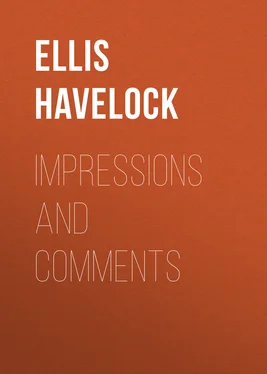Havelock Ellis - Impressions and Comments
Здесь есть возможность читать онлайн «Havelock Ellis - Impressions and Comments» — ознакомительный отрывок электронной книги совершенно бесплатно, а после прочтения отрывка купить полную версию. В некоторых случаях можно слушать аудио, скачать через торрент в формате fb2 и присутствует краткое содержание. Жанр: foreign_prose, foreign_antique, на английском языке. Описание произведения, (предисловие) а так же отзывы посетителей доступны на портале библиотеки ЛибКат.
- Название:Impressions and Comments
- Автор:
- Жанр:
- Год:неизвестен
- ISBN:нет данных
- Рейтинг книги:4 / 5. Голосов: 1
-
Избранное:Добавить в избранное
- Отзывы:
-
Ваша оценка:
- 80
- 1
- 2
- 3
- 4
- 5
Impressions and Comments: краткое содержание, описание и аннотация
Предлагаем к чтению аннотацию, описание, краткое содержание или предисловие (зависит от того, что написал сам автор книги «Impressions and Comments»). Если вы не нашли необходимую информацию о книге — напишите в комментариях, мы постараемся отыскать её.
Impressions and Comments — читать онлайн ознакомительный отрывок
Ниже представлен текст книги, разбитый по страницам. Система сохранения места последней прочитанной страницы, позволяет с удобством читать онлайн бесплатно книгу «Impressions and Comments», без необходимости каждый раз заново искать на чём Вы остановились. Поставьте закладку, и сможете в любой момент перейти на страницу, на которой закончили чтение.
Интервал:
Закладка:
August 5. —It is an idea of mine that a country with a genius for architecture is only able to show that genius supremely in one style, not in all styles. The Catalans have a supreme genius for architecture, but they have only achieved a single style. The English have attempted all styles of architecture, but it was only in Perpendicular that we attained a really free and beautiful native style in our domestic buildings and what one might call our domestic churches. Strassburg Cathedral is thoroughly German and acceptable as such, but Cologne Cathedral is an exotic, and all the energy and the money of Germany through a thousand years can never make it anything but cold, mechanical, and artificial. When I was in Burgundy I felt that the Burgundians had a genius for Romanesque, and that their Gothic is for the most part feeble and insipid. Now, how about the Normans? One cannot say their Romanesque is not fine, in the presence of William the Conqueror's Abbaye aux Hommes, here at Caen. But I should be inclined to ask (without absolutely affirming) whether the finest Norman Romanesque can be coupled with the finest Burgundian Romanesque. The Norman genius was, I think, really for Gothic, and not for what we in England call "Norman" because it happened to come to us through Normandy. Without going to Rouen it is enough to look at many a church here. The Normans had a peculiar plastic power over stone which Gothic alone could give free scope to. Stone became so malleable in their hands that they seem as if working in wood. Probably it really was the case that their familiarity with wood-carving influenced their work in architecture. And they possessed so fine a taste that while they seem to be freely abandoning themselves to their wildest fantasies, the outcome is rarely extravagant (Flaubert in his Tentation is a great Norman architect), and at the best attains a ravishing beauty of flowing and interwoven lines. At its worst, as in St. Sauveur, which is a monstrosity like the Siamese twins, a church with two naves and no aisles, the general result still has its interest, even apart from the exquisite beauty of the details. It is here in Gothic, and not in Romanesque, that the Normans attained full scope. We miss the superb repose, the majestic strength, of the Romanesque of Burgundy and the south-west of France. There is something daring and strange and adventurous in Norman Romanesque. It was by no accident, I think, that the ogive, in which lay the secret of Gothic, appeared first in Norman Romanesque.
August 8. —I have sometimes thought when in Spain that in ancient university towns the women tend to be notably beautiful or attractive, and I have imagined that this might be due to the continuous influence of student blood through many centuries in refining the population, the finest specimens of the young students proving irresistible to the women of the people, and so raising the level of the population by sexual selection. At Salamanca I was impressed by the unusual charm of the women, and even at Palencia to some extent noticed it, though Palencia ceased to be the great university of Spain nearly eight centuries ago. At Fécamp I have been struck by the occasional occurrence of an unusual type of feminine beauty, not, it seems to me, peculiarly Norman, with dark, ardent, spiritual eyes, and a kind of proud hierarchical bearing. I have wondered how far the abbots and monks of this great and ancient abbey of Benedictines were occupied—in the intervals of more supra-mundane avocations—in perfecting, not only the ancient recipe of their liqueur, but also the physical type of the feminine population among which they laboured. The type I have in mind sometimes rather recalls the face of Baudelaire, who, by his mother's family from which he chiefly inherited, the Dufays, belonged, it is held probable, to Normandy.
August 9. —Typical women of Normandy often have a certain highly-bred air. They are slender when young, sometimes inclined to be tall, and the face—of course beautiful in complexion, for they dwell near the sea—is not seldom refined and distinguished. See the proud, sensitive nostrils of that young woman sweeping the pavement with her broom in front of the house this morning; one can tell she is of the same race as Charlotte Corday. And I have certainly never found anywhere in France women who seem to me so naturally charming and so sympathetic as the women who dwell in all this north-western district from Paris to the sea. They are often, as one might expect, a little English-like (it might be in Suffolk on the other side of the Channel, and Beauvais, I recall, has something of the air of old Ipswich), but with a vivacity of movement, and at the same time an aristocratic precision and subtlety one fails to find in the English. When a pretty English girl of the people opens her mouth the charm is often gone. On the contrary, I have often noticed in Normandy that a seemingly commonplace unattractive girl only becomes charming when she does open her mouth, to reveal her softness of speech, the delicately-inflexed and expressive tones, while her face lights up in harmony with her speech. Now—to say nothing of the women of the south, whose hard faces and harsh voices are often so distressing—in Dijon, whence I came to Normandy this time, the women are often sweet, even angelic of aspect, looking proper material for nuns and saints, but, to me at all events, not personally so sympathetic as the Norman women, who are no doubt quite as good but never express the fact with the same air of slightly Teutonic insipidity. The men of Normandy I regard as of finer type than the Burgundian men, and this time it is the men who express goodness more than the women. The Burgundian men, with their big moustaches turned up resolutely at the points and their wickedly-sparkling eyes, have evidently set before themselves the task of incorporating a protest against the attitude of their women. But the Norman men, who allow their golden moustaches to droop, are a fine frank type of manhood at the best, pleasantly honest and unspoilt. I know, indeed, how skilful, how wily, how noble even, in their aristocratic indifference to detail, these Normans can be in extracting money from the stranger (have I not lunched simply at the Hostel Guillaume-le-Conquérant in the village of Dives for the same sum on which I have lived sumptuously for three days at the Hotel Victoria in the heart of Seville?), but the manner of their activity in this matter scarcely seems to me to be happily caught by those Parisians who delight to caricature, as mere dull, avaricious plebeians, "Ces bons Normands." Their ancient chronicler said a thousand years ago of the Normans that their unbounded avarice was balanced by their equally unbounded extravagance. That, perhaps, is a clue to the magnificent achievements of the Normans, in the spiritual world even more than in the material world.
August 10.—On leaving France by the boat from Dieppe I selected a seat close to which, shortly afterwards, three English people—two young women and a man—came to occupy deck-chairs already placed for them by a sailor and surrounded by their bags and wraps. Immediately one of the women began angrily asking her companions why her bag had not been placed the right side up; she would not have her things treated like that, etc. Her companions were gentle and conciliatory,—though I noticed they left her alone during most of the passage,—and the man had with attentive forethought made all arrangements for his companions' comfort. But, somehow, I looked in wonder at her discontented face and heard with surprise her peevish voice. She was just an ordinary stolid nourishing young Englishwoman. But I had been in France, and though I had been travelling for a whole fortnight I had seen nothing like this. She lay back and began reading a novel, which she speedily exchanged for a basin. I fear I felt a certain satisfaction at the spectacle. It is good for the English barbarian to be chastised with scorpions.
Читать дальшеИнтервал:
Закладка:
Похожие книги на «Impressions and Comments»
Представляем Вашему вниманию похожие книги на «Impressions and Comments» списком для выбора. Мы отобрали схожую по названию и смыслу литературу в надежде предоставить читателям больше вариантов отыскать новые, интересные, ещё непрочитанные произведения.
Обсуждение, отзывы о книге «Impressions and Comments» и просто собственные мнения читателей. Оставьте ваши комментарии, напишите, что Вы думаете о произведении, его смысле или главных героях. Укажите что конкретно понравилось, а что нет, и почему Вы так считаете.












